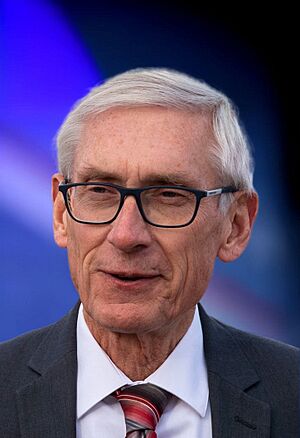Tony Evers facts for kids
Quick facts for kids
Tony Evers
|
|
|---|---|

Evers in 2022
|
|
| 46th Governor of Wisconsin | |
| Assumed office January 7, 2019 |
|
| Lieutenant | Mandela Barnes Sara Rodriguez |
| Preceded by | Scott Walker |
| 26th Superintendent of Public Instruction of Wisconsin | |
| In office July 6, 2009 – January 7, 2019 |
|
| Governor | Jim Doyle Scott Walker |
| Preceded by | Elizabeth Burmaster |
| Succeeded by | Carolyn Stanford Taylor |
| Personal details | |
| Born |
Anthony Steven Evers
November 5, 1951 Plymouth, Wisconsin, U.S. |
| Political party | Democratic |
| Spouse | Kathy Evers |
| Children | 3 |
| Residence | Governor's Mansion |
| Education | University of Wisconsin, Madison (BA, MA, PhD) |
| Signature |  |
| Website | |
Tony Evers (born November 5, 1951) is an American politician and educator. He has been the 46th governor of Wisconsin since 2019. Before becoming governor, he worked as Wisconsin's Superintendent of Public Instruction from 2009 to 2019. He is a member of the Democratic Party.
Tony Evers grew up in Plymouth, Wisconsin. He studied at the University of Wisconsin–Madison, earning a Ph.D. After teaching for several years, he became a school leader. He was a principal and then a district superintendent. He ran for Superintendent of Public Instruction in 1993 and 2001 but did not win. He then served as deputy superintendent from 2001 to 2009. In 2009, he ran again and won. He was reelected twice more, in 2013 and 2017.
On August 23, 2017, Evers announced he would run for governor. He challenged the Republican governor, Scott Walker. Many people thought Walker was not doing well, especially with his education policies. Evers won the Democratic primary election in August 2018. His running mate, Mandela Barnes, became the candidate for lieutenant governor. They won against Scott Walker in the 2018 election by a small amount. Evers was reelected in 2022 by a larger amount.
Governor Evers often uses his veto power. This power is very strong for Wisconsin governors. He uses it because he often disagrees with the Republican-controlled Wisconsin Legislature. He has used his veto power more than any other governor in Wisconsin's history. He has also used a special "line-item veto" to change parts of bills written by Republicans.
Contents
Tony Evers: Wisconsin's Governor
Early Life and School Days
Tony Evers was born in 1951 in Plymouth, Wisconsin. His parents were Jean and Raymond Evers, a doctor. His first job as a kid was cleaning mold off cheese. As a young adult, he also worked helping people in a nursing home. He went to Plymouth High School.
He earned three degrees from the University of Wisconsin–Madison. These degrees were in educational leadership. He started his career as a teacher. He also worked as a media coordinator in the Tomah school district. From 1979 to 1980, he was a principal at Tomah Elementary School. From 1980 to 1984, he was principal at Tomah High School. He then became a superintendent for different school districts. He worked in Oakfield from 1984 to 1988. Then he worked in Verona from 1988 to 1992. From 1992 to 2001, he was an administrator for a special education service in Oshkosh.
Helping Wisconsin Schools: Superintendent Role
Evers first ran for state superintendent in 1993 but lost. In 2001, he ran again and came in third. After Elizabeth Burmaster won, she made Evers her deputy superintendent. He held this job until 2009. He also led the Council of Chief State School Officers.
State Superintendent
Evers ran for superintendent again in 2009 and won. He beat Rose Fernandez in the election. In April 2013, he won reelection against Don Pridemore. In 2017, Evers defeated Lowell Holtz with about 70% of the votes.
In 2009, Evers used government emails for fundraising. He and another employee were fined $250. This was for asking for campaign donations during work hours.
In 2018, a court ruled that Evers did not violate any laws. This was when he denied busing to a Catholic school. He said there was another Catholic school nearby.
Working with the Every Student Succeeds Act
In March 2016, the United States Department of Education chose Evers for a special committee. This committee helped write rules for the Every Student Succeeds Act (ESSA). ESSA is a law about education in the U.S.
Ideas for School Funding
Evers suggested a plan called "Fair Funding for Our Future." This plan aimed to improve how schools in Wisconsin are funded. It wanted to make funding fair and clear for all schools. Wisconsin Governor Scott Walker never used Evers's plan. He said it would cost too much money.
Supporting Tribal Nations
As superintendent, Evers worked with tribal nations in Wisconsin. He wanted to build strong partnerships with them. This included working with the Great Lakes Inter-Tribal Council.
Helping Rural Schools
Evers's Rural Schools Advisory Council suggested "sparsity aid." This aid helps small school districts with fewer students. These districts often have high fixed costs. Since this aid started, many schools have received help.
Focusing on Student Mental Health
In 2017, Evers helped get more money for schools. This money was to hire more trained professionals. It also provided more funding for mental health training.
Becoming Governor of Wisconsin
Winning the Elections
On August 23, 2017, Tony Evers announced he would run for governor. He said his strong win as state superintendent in 2017 encouraged him. He also criticized Governor Walker's policies. Evers launched his first campaign ad against Walker on August 28, 2017.
Evers won the Democratic primary election on August 14, 2018. There were eight candidates. On November 6, 2018, Evers narrowly beat Governor Walker.
Evers ran for reelection in 2022. His running mate from 2018, Mandela Barnes, decided to run for U.S. Senate instead. In August 2022, Evers ran unopposed in the Democratic primary. Sara Rodriguez became his new running mate. Evers and Rodriguez won the general election. They defeated Tim Michels and Roger Roth.
What Governor Evers Has Done

Using His Veto Power
Governor Evers has used his veto power a lot. This is because he often disagrees with the Republican-controlled Wisconsin Legislature. He has used his veto power more than any other governor in Wisconsin's history. He can also use a special "line-item veto." This lets him change parts of bills written by Republicans.
Dealing with Challenges from Lawmakers
After Evers was elected, some Republican lawmakers tried to limit his powers. This happened even before he took office. They passed laws to reduce his authority over economic issues. They also made it harder for the attorney general to settle lawsuits. These actions were criticized as a "power play." Some of these new laws were later challenged in court.
In 2019, a judge ruled that some appointments made by the previous governor were unconstitutional. Evers reappointed most of these people. However, he replaced 15 of them. The Wisconsin Supreme Court later said the legislature's actions were not unconstitutional.
Later, some officials appointed by the previous governor refused to leave. This happened even after their terms ended. Evers appointed replacements, but the Senate did not approve them. The Wisconsin Supreme Court ruled that these officials could stay. The Senate has also rejected many of Evers's appointments. This is much more than in the past 40 years.
In Evers's second term, Republicans tried to change the state constitution. They wanted to limit the governor's power over state spending. Voters were asked to approve two changes in 2024. One would stop the governor from spending money not clearly approved by law. The other would require lawmakers to approve federal funds. Voters rejected both changes.
First Term Highlights
In February 2019, Evers pulled Wisconsin National Guard troops from the Mexico border. President Donald Trump had sent them there. Evers said there was no good reason for the troops to be there. He said there was no national security crisis at the border.
Handling the COVID-19 Pandemic
On March 12, 2020, Evers declared a public health emergency. This was because of the COVID-19 pandemic. The next day, he ordered all schools to close. On March 17, he banned public gatherings of more than 10 people. This was expanded to a "safer at home" order on March 25. People could only leave home for important reasons or exercise. A poll showed that 65% of people approved of how he handled the pandemic.
On April 6, Evers tried to delay the state's April 7 election. This was to prevent the virus from spreading. However, the Wisconsin Supreme Court blocked his order. The election went ahead as planned.
On April 16, Evers extended the statewide lockdown. He also ordered schools to stay closed for the rest of the year. Lawmakers sued to stop this order. The Wisconsin Supreme Court struck it down on May 13. Evers said lawmakers cared more about power than people's lives.
On July 30, Evers issued a statewide mask mandate. He declared a new state of emergency to do this. Republicans sued again, saying he had too much power. In March 2021, the Wisconsin Supreme Court struck down Evers's mask mandate.
After the shooting of Jacob Blake in Kenosha, Evers spoke out. He criticized the excessive use of force by police. He sent the Wisconsin National Guard to Kenosha to help. He also asked lawmakers to pass laws about police actions.
Second Term Highlights
After Evers was reelected in 2022, he worked with lawmakers on local government funding. This issue had been a problem for a long time. They agreed on a plan to give more state tax money to local governments. This was called 2023 Wisconsin Act 12. It increased shared revenue for cities and towns. It also gave them more ways to raise their own money.
Evers also used his line-item veto to help schools. He changed a few words in the budget. This allowed school districts to ask for more tax money through votes. He also vetoed a tax cut for high-income earners.
Later in 2023, Evers and lawmakers agreed on funding for American Family Field. This is the stadium for the Milwaukee Brewers baseball team. The team had said they might leave if the stadium was not improved.
A big change in Evers's second term was the election of Janet Protasiewicz. She became a justice on the Wisconsin Supreme Court. This gave liberals a majority on the court. This led to changes in how voting districts are drawn. This could make future elections more fair.
After the 2024 state elections, Evers asked for a way for citizens to propose laws directly. This is called a citizen-initiated referendum.
What Tony Evers Believes In
Evers has said his main goals are to improve schools, make healthcare cheaper, and fix roads.
Education Plans
Evers wants to give more money to K-12 schools. He also wants to help schools that are not doing well. He wants to offer Pre-K education to all students. He also wants to keep college tuition frozen for in-state students.
Fair Voting Maps
Evers wants to create fair voting maps. In January 2020, he created a special group to draw new maps. This group is nonpartisan, meaning it does not favor any political party. This was to offer an alternative to maps drawn by the Republican-controlled legislature.
Gun Safety
Evers strongly supports background checks for all gun purchases. He also supports "red flag laws." These laws would let family members or police ask a judge to temporarily take away someone's guns. This would happen if the person is a danger to themselves or others.
Healthcare for Everyone
Evers believes that past decisions made healthcare more expensive in Wisconsin. He points out that Minnesota has lower insurance costs. He supports laws that protect people from higher insurance costs due to age or health problems. He also wants children to stay on their parents' health insurance until age 26. He plans to remove Wisconsin from a lawsuit trying to get rid of the Affordable Care Act.
Immigration and Refugees
Evers supports allowing undocumented immigrants in Wisconsin to get driver's licenses. He calls this "common sense."
In December 2019, Evers said Wisconsin would welcome refugees. He called them "part of the fabric of [the] state." He criticized the federal government's refugee policies. In February 2020, he asked the U.S. Secretary of State to stop talks with Laos. These talks were about deporting Hmong refugees from Wisconsin.
Taxes and Money
During his 2018 campaign, Evers proposed a 10% income tax cut. This was for Wisconsin residents earning less than $100,000 per year. He also promised not to raise taxes. However, his first budget proposal in 2019 increased taxes by $1.3 billion. He called this a "small" amount. His second budget also proposed a tax increase. He did cut income taxes by 10%. This was paid for by raising taxes on large manufacturers and farmers.
LGBTQ+ Rights
In June 2019, Evers ordered the rainbow flag to fly at the Wisconsin Capitol Building. This was for Pride month. It was the first time the rainbow flag had flown there.
Better Roads
Evers has said that Wisconsin has some of the worst roads in the country. He promised to focus on improving roads and bridges. He is open to using a gas tax to pay for these projects.
His Family Life
Tony Evers is married to his high school sweetheart, Kathy. They have three adult children. They also have nine grandchildren. Evers had esophageal cancer before having surgery in 2008.
Images for kids
See also
 In Spanish: Tony Evers para niños
In Spanish: Tony Evers para niños
 | Aaron Henry |
 | T. R. M. Howard |
 | Jesse Jackson |



